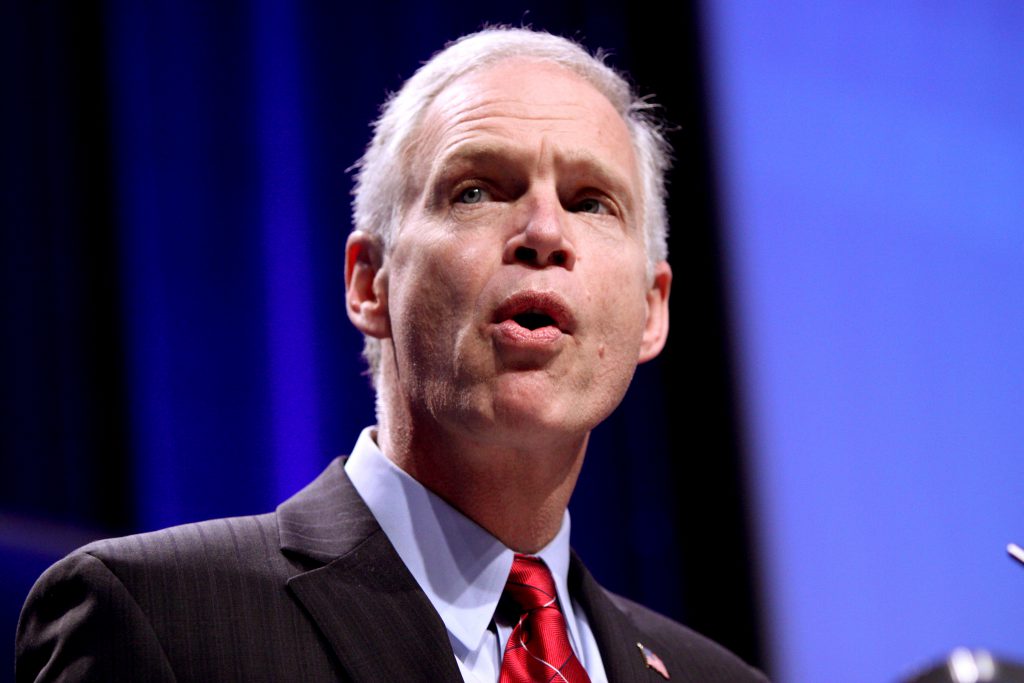Ron Johnson Favors “Limited” COVID-19 Vaccination
"I see no reason to be pushing vaccines on people," the senator said.

Ron Johnson. Photo by Gage Skidmore from Peoria, AZ, United States of America / (CC BY-SA)
Republican U.S. Sen. Ron Johnson said distribution of the COVID-19 vaccine should have been “limited,” undermining a national push to end the pandemic.
Johnson made the comments to radio host Vicki McKenna, a vaccine skeptic who has been opposed to pandemic restrictions and has often cast doubt on the seriousness of COVID-19.
“We probably should have limited the distribution to the vulnerable,” Johnson said in the radio interview. Referring to the fact that young people are less at risk from the disease, he said, “I see no reason to be pushing vaccines on people.”
The benefit of vaccinating broadly in the community is “herd immunity,” which is when so many people are immune from the virus that it cannot easily spread within communities. Scientists estimate that around 70 percent of the United States population will need to be vaccinated in order to achieve herd immunity and end the pandemic.
As of Friday afternoon, 91.2 million people in the U.S., or 27.5 percent of the total population, have been fully vaccinated.
Johnson, a former plastics company executive with no medical background, denied in the interview that vaccinating a broad swath of the population should be a priority.
“If you have a vaccine, quite honestly, what do you care if your neighbor has one or not?” Johnson said. “What is it to you?”
It’s also the latest example of Johnson, who had COVID-19 in October, expressing skepticism about the national vaccination effort. In March, he told an interviewer that he had declined to get vaccinated because he had been infected. That goes against CDC recommendations. Earlier in the pandemic, he repeatedly expressed opposition to public health restrictions and federal economic responses.
His comments in the Thursday interview with McKenna were framed around his opposition to “vaccine passports,” or a document verifying a person’s vaccination status. Many Republicans oppose the idea, and it has not gotten much traction nationally or at the state level. Johnson said he is “highly suspicious of what’s happening here” and said he would “vigorously resist” the notion. Republican lawmakers in Wisconsin also sought to ban vaccine passports. Unlike some other Republican leaders, though, Johnson did not limit his remarks to the vaccine passports but went on to question the vaccination efforts themselves.
Johnson is not the only Wisconsin Republican to court controversy by speaking against those efforts.
Assembly Speaker Robin Vos, R-Burlington, this week posted a message on Facebook that appeared to mock pro-vaccine messages. In March, U.S. Rep. Tom Tiffany, R-Hazelhurst, said at a town hall meeting that he had encouraged his adult daughters not to get vaccinated.
In response to Johnson’s comments, the Wisconsin Democratic Party said Johnson “is a conspiracy theorist who has proven time and again that he’ll put his extremism over the people of Wisconsin.”
Johnson is up for reelection in 2022. The race has already attracted several Democratic candidates, including state Treasurer Sarah Godlewski, Milwaukee Bucks executive Alex Lasry and Outagamie County Executive Thomas Nelson. Johnson hasn’t said whether he will run for a third term.
Opposing CDC Guidance, Ron Johnson Questions Need For Broad Vaccine Push was originally published by Wisconsin Public Radio.


















Well beyond questioning the man’s judgement, it is now becoming clear that the state of his mental health is at issue.
Can anyone explain what the heck is wrong with this haircut masquerading as a man?
Democrats need a ‘strong contender’ to run against this man posing as a Senator. It is not to say that diverse opinions are not valued, but an absolute disregard for objectivity and science is serious and dangerous. It is one thing to voice a diverse opinion, it is another to voice conspiracy theories, beliefs not grounded in facts, and to have influence that puts others health and lives at risk. Jonathan Mann, MD, former head of the World Health Organization, put it this way, ‘male dominated societies are a threat to public health.’